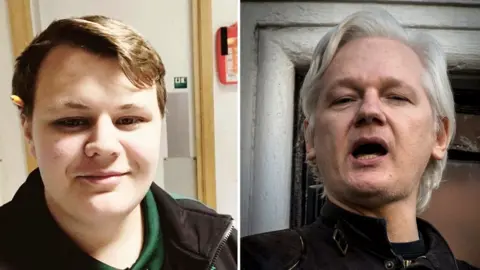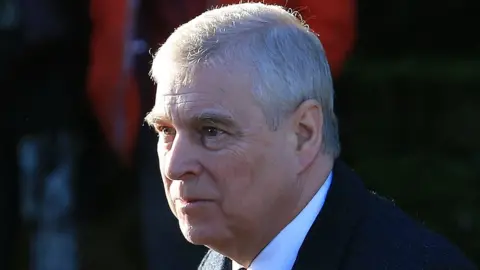Harry Dunn crash: Family urge government to block Julian Assange extradition
 Justice4Harry19/PA Media
Justice4Harry19/PA MediaThe family of Harry Dunn has urged the government to refuse the extradition of Julian Assange until the US returns the suspect in his death back to the UK.
Dunn family spokesman Radd Seiger accused the US of "hypocrisy" in seeking Assange's extradition, despite rejecting the return of Anne Sacoolas.
She is suspected of causing the teenager's death by dangerous driving.
The family said the foreign secretary told them he is "reviewing all options".
The 19-year-old's parents have called on Dominic Raab and the government to refuse any further extradition requests by the US - including that of the Wikileaks co-founder - after US Secretary of State Mike Pompeo rejected extraditing Sacoolas, last month.
 Aiken Standard Archive
Aiken Standard ArchiveMs Sacoolas, a US national and the wife of an intelligence officer, claimed diplomatic immunity after the fatal crash in August, and returned to the US.
Mr Seiger said the Foreign Affairs Committee had accepted their request for a public inquiry into the extradition, and the diplomatic immunity given to Ms Sacoolas, who reportedly worked for the CIA.
It comes after the Foreign Office said it had "no plans" to launch a public inquiry into the teenager's death, saying it was "confident" the case had been "handled properly and lawfully throughout".
Mr Dunn died after his motorbike was in collision with a car owned by Mrs Sacoolas.
The crash happened outside RAF Croughton where Mrs Sacoolas' husband Jonathan worked as an intelligence officer.
Mr Dunn's mother, Charlotte Charles and father, Tim Dunn, said Mr Raab told them in a January 27 meeting that the government is "reviewing all options" after the US refused to return Ms Sacoolas to the UK.
Referring to Mr Assange's potential extradition to the US, Mr Seiger said Mr Dunn's family "understand and respect" the "huge public interest" attached to extradition, adding that "no one must be allowed to evade justice" by fleeing a country.
Treaty 'torn up'
In refusing the UK's "lawful" extradition request, Mr Seiger accused the US of launching "the single greatest attack" on its "so-called special relationship" with the UK.
Mr Seiger added: "The US is not behaving like an ally and has effectively thumbed its nose up at the UK and ignored the clearly laid out provisions in the treaty, effectively tearing it up."
He said the principle of "reciprocity" is at the heart of any extradition treaty, which the US is "failing to abide by" in its "disgraceful refusal" to extradite Ms Sacoolas.
"In doing so, they are demonstrating an extraordinary amount of hypocrisy, and the double standards on display are unprecedented," he added.
Mr Seiger continued: "On behalf of Harry Dunn's family and the millions of concerned citizens in the UK, I now demand that the UK authorities block any further extraditions to the US, including the one of Julian Assange, until such time as Anne Sacoolas is extradited and back on UK soil facing the justice system here."
 AFP
AFPMr Pompeo previously raised the prospect of "a deal to be done" over Mr Dunn's case and the US investigation of Prince Andrew's Jeffery Epstein connections.
But Mr Raab said there would be no "haggling" over the two cases, saying the extradition treaty with the US is "rules-based".
Mr Seiger said Mr Dunn's family had been "badly let down" since his death and urged the government to "show us what they are made of, if they are to instil any confidence that they really do have our backs."
His comments followed Saturday's protest in which hundreds of Assange's supporters marched through London ahead of the start of his extradition trial at Woolwich Crown Court on Monday.
Mr Assange is facing extradition to the US on 18 charges and faces up to 175 years in prison if found guilty.
